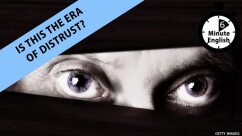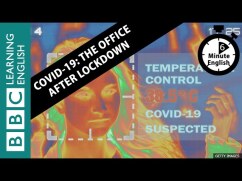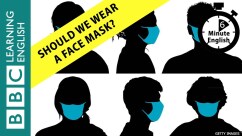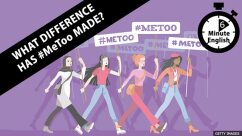BBC LEARNING ENGLISH
6 Minute English
?Should we wear face masks
This is not a word-for-word transcript
Rob
Hello This is 6 Minute English from BBC Learning English I’m Rob
Sam
And I’m Sam
Rob
With the outbreak of the coronavirus epidemic, people in many countries around
the world have started wearing face masks to protect both themselves and
others they come into contact with In this programme we’ll be asking whether
wearing masks in public can help prevent the spread of coronavirus in the
community
Sam
Face masks have long been popular in some Asian countries but with the spread
of Covid-19, they’re increasingly being seen in other parts of the world too
Rob
Wearing a protective mask or face covering is nothing new Medical masks have a
long history from the plagues of medieval Europe to nineteenth century
outbreaks of cholera in the United States, but when did they start to be
commonly used? That’s my quiz question for today when and where were face
masks first widely used? Was it
a) 1855 in Vienna,
b) 1905 in Chicago, or
c) 1955 in London
Sam
Well, you mentioned cholera outbreaks in the US, so I’ll say b) 1905 in Chicago
Rob
Right Sam, we’ll find out later if you were right Now, face masks may inspire
confidence but what is the evidence that they actually protect the wearer from
contracting the virus or prevent infected people from spreading the virus to
?others
Sam
Professor Robert West has conducted a review of over twenty studies looking
into the evidence Here he is speaking to the BBC World Service programme
Health Check…
Professor Robert West
The evidence is equivocal on it It doesn’t tell you anything yet - hopefully that
will change So we’re thrown back on first principles and this is why, as in so
many areas of public health, you get such a heated debate because people are
really relying on their opinion on things and you will have one group who say,
‘Well, it stands to reason’, - the good old ‘stands to reason’ argument – which is
obviously, if you’ve got a covering in front of your face, and you’re speaking or
coughing into that covering, it’s going to trap quite a lot of the virus on the
droplets you’ll be emitting
Rob
So far the evidence over whether face masks are helpful or harmful is equivocal –
difficult to interpret because it seems to have two opposite or contradictory
meanings Based on current evidence, Professor West feels we cannot say
whether mask-wearing is beneficial
Sam
Some evidence suggests that wearing masks can prevent the disease spreading
and some suggests the opposite
Rob
There may be reasons why wearing masks could actually increase the spread of
coronavirus
Sam
However for some people, it stands to reason that masks are beneficial–
meaning it is obviously true from the facts
Rob
Actually, the evidence is far from obvious But everyone has an opinion on the
issue and after weeks of stressful lockdown, this can lead to heated debate –
discussion or argument in which people become angry and excited
Sam
Up until recently, the World Health Organisation said there were two groups who
definitely should wear masks people showing symptoms of the virus and their
carers
Rob
But that left the problem of people who have the virus without knowing it and
maybe unintentionally emitting it – sending something out into the air, for
example a noise or smell, or in this case, coronavirus In June the WHO advice
changed – now they say masks should be worn in public where social distancing
measures are not possible
Sam
But the advantages of wearing masks might be outweighed by other
considerations, as Professor West explains…
Professor Robert West
It could also have unfortunate negative consequences in terms of mask shaming
– that people feel compelled to wear masks in situations where it’s actually not
helpful and may be harmful because it’s expected of them and they feel that they
would be judged if they didn’t But I think in addition to that, one of the problems
we have is that masks can potentially create a false sense of security
Rob
One negative effect is the practice of mask shaming – criticising or humiliating
someone for not wearing a face covering
Sam
Another problem is that wearing masks might create a false sense of security – a
?feeling of being safer than you really are Is that what happened in 1905 Rob
Rob
Ah yes, today’s quiz question I asked you when face masks were first widely
?used
Sam
And I said, b) 1905 in Chicago
Rob
Well done Sam, you were absolutely right It was 1905 in Chicago when Dr Alice
Hamilton first noticed that carers wearing masks to treat scarlet fever patients,
did not get sick
Sam
Interesting Today we we’ve been discussing whether wearing masks helps
prevent infected people emitting – or sending out, coronavirus
Rob
So far the evidence is equivocal – unclear because it seems contradictory In
other words, we can’t say either way for certain
Sam
But for some, it stands to reason - meaning it’s obviously true - that mask[1]wearing is a good idea
Rob
This disagreement over wearing face coverings has started heated debate –
that’s discussion which becomes angry or excited
Sam
And this in turn has led to incidents of mask shaming – criticising or mocking
people for not wearing a face mask
Rob
A final drawback is that masks might give the wearer a false sense of security –
that’s belief that they are safe when they are not
Sam
That’s all we’ve got time for today
Rob
Bye for now
Sam
Bye
VOCABULARY
equivocal
difficult to interpret because it seems to have two opposite or contradictory
meanings
it stands to reason (that)
is obviously true from the facts
heated debate
discussion or argument in which people become angry and excited
emitting
sending out into the air, for example a noise or smell or a virus
mask shaming
criticising, mocking or humiliating someone for not wearing a face covering
false sense of security
belief that you are safe when you are not









